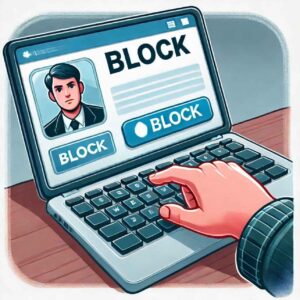Welcome Blessings!
(Tap 🔽 to see more topics!)


How to deal with bashers? Let’s get straight to the point. Bashers exist, and dealing with them is part of life, primarily online. You could be minding your own business, doing what you love, and a random troll or hater throws negativity your way out of nowhere. Some desperate and envious people love to throw shade, whether it’s a rude comment, a nasty review, or a random message on social media.
But the thing is you don’t have to let any of it get to you. If you’re not intentionally hurting anyone, anyone’s opinion doesn’t define you. Think of it like ramen- if someone doesn’t like it, that’s not the ramen’s fault. It’s just not that person’s thing. And the same goes for you. Whether you’re a dish, a fruit, or just being yourself, not everyone will vibe with what you offer—and that’s completely okay.
You can’t please everyone, and you shouldn’t have to. Don’t stress if some people don’t get you or like what you do. Focus on the ones who support you because they’re the ones who truly matter. In a world where everyone has a voice online, it is customary to run into haters, especially those who hide behind anonymity to bring you down. Instead of letting their negativity shake your confidence, today, you will learn seven ways to deal with it and keep your peace intact.
Let’s make one thing clear—karma doesn’t forget, and neither does God. It might feel like those who tear others down are getting away with it, but rest assured, everything thrown out into the world has a way of returning. Whether it’s in this life or the next, the negativity people spread… the hate, the lies, and the destruction- doesn’t go unnoticed. It may not come back right away, but just like planting seeds, the harm they sow will eventually bear fruit- and when it does, it will hit them harder than they could ever imagine.
It’s easy for a basher to hide behind a screen, throwing hurtful words and feeling untouchable. They think they can cause damage from the shadows without facing the consequences. But the reality is no one escapes the truth. God sees everything, and while it might feel like someone’s getting away with it, trust that those negative actions will eventually come back to them, often in ways they least expect.
As the Bible says, “Do not be deceived: God cannot be mocked. A man reaps what he sows” (Galatians 6:7). In other words, when someone spreads hate or destruction, they will eventually face the outcome of those actions. It’s not always immediate, but it will come. The timing may be in God’s hands, but rest assured, He holds people accountable.
It’s common for those who spread lies, rumors, or hateful comments to feel like they’re winning—like they’re getting away with something. But the truth is their peace is fragile even if they seem to be sitting pretty now. Their words might sting for a moment, but the emotional and spiritual toll on them is far greater. The damage they’re doing to others doesn’t compare to the harm they’re doing to their soul. The false sense of satisfaction they feel now will fade, leaving them with nothing but the consequences of their actions. Karma doesn’t forget, and it never misses its mark.
When you find yourself under attack, whether from bashers online or people spreading hurtful words- remember this… they’re not getting away with it. They might think they are, but what goes around always comes around. God is watching, and the consequences will come swiftly for those who act with full knowledge of their wrongdoings.
In the meantime, don’t let their negativity shake you. Keep your heart pure, stay strong, and remember that your peace and integrity will always outweigh their hate. Karma will deal with them while you focus on staying true to yourself. You don’t have to worry about being bashed or criticized because those who do wrong will ultimately face the consequences.

Before we learn how to handle them, let’s take a moment to understand why people feel the need to hate in the first place. What fuels their negativity? Below are some of the most common reasons:
1. Insecurity and Unhappiness
Most haters project their insecurities onto others. If they see someone thriving in an area where they feel inadequate, their response is to tear that person down. It’s like watching someone climb a ladder while standing on the ground. They don’t want to do the work to climb themselves, so they’d instead shake the ladder.
2. Jealousy and Envy
People who can’t handle seeing others succeed often lash out with negativity. Instead of using someone’s achievements as inspiration, they view it as a threat. A classic example? Celebrities and influencers constantly receive hate simply for being in the spotlight.
3. Boredom and Attention-Seeking
Some people thrive on drama. They enjoy stirring the pot and watching how others react. Responding to them angrily or frustrated feeds their desire for attention.
4. Misinformation and Ignorance
Not everyone who spreads hate does so intentionally. Some people genuinely believe false information, make baseless claims, or spread rumors without realizing the harm they’re causing.
5. Hatred and Intolerance
Unfortunately, some individuals hold deep-seated biases and use online platforms to express their intolerance. Whether it’s racism, sexism, or any form of discrimination, these individuals seek to diminish others to validate their own flawed beliefs.
Knowing the motivation behind haters helps remove the personal sting from their words. Their behavior is a reflection of them, not you!
Constructive criticism can be a valuable source of feedback and improvement for anyone who wants to grow and learn from their mistakes.

Imagine you’re a chef serving a beautiful meal. Some people will love it… others might dislike it. A few might even throw a tantrum because it’s not their taste. But does that mean you stop cooking? No! You keep making delicious dishes for those who appreciate them. The same applies to handling negativity—don’t let a few bad reviews stop you from doing what you love.
Destructive bashing can be a source of stress and anxiety for anyone who has to deal with it online. It can affect your self-esteem, your mood, and your productivity. However, you don’t have to let it ruin your day. Below are some tips on how to handle bashing:
1. Don’t Engage—Silence is Powerful
You can’t control what others say or do but can control how you respond. Ignoring negativity is one of the most potent ways to disarm a basher. When you stop engaging with their toxic energy, they lose interest. After all, they won’t keep throwing stones if they’re not getting a rise out of you.
The more you ignore them, the less power they have over you. Engaging with bashers often fuels their negativity. But, how to handle them effectively?
Arguing with a hater is like wrestling with a pig—you both get dirty, but the pig enjoys it. Don’t waste your energy.
2. Stay Calm and Don’t Feed the Fire
For example, you’re driving down the road, and another driver cuts you off. What’s your first instinct? You need to speed up and give them a piece of your mind. But then, you remember—it’s not worth it. Engaging with road rage only escalates things. The same goes for dealing with online bashers. Don’t let them take control of your emotions.
You’re playing right into their hands when you respond angrily or defensively. Most bashers want a reaction—any reaction. They’re fishing for drama, and your anger is the bait. Instead of reacting, take a deep breath and remember that these people’s negativity has nothing to do with you.
3. Understand Why Bashers Exist
Let’s take a moment to understand the psychology behind why people hate others. The truth is, bashers aren’t happy people. There are always deeper reasons—insecurity, jealousy, boredom, or a lack of empathy.
A basher is like a person who goes to a fancy restaurant but spends the entire meal complaining about the food. They’re not focused on their enjoyment; instead, they’re trying to bring others down to make themselves feel better. If you can remind yourself that their behavior says more about them than it does about you, it will be easier to shrug off their negativity.
4. Focus on the Positives
When dealing with negativity, getting caught up in hurtful comments is easy. But instead of letting one rude person overshadow all the love and support you receive, take a moment to focus on the positive. Think about the friends, family, or followers who appreciate you and what you do.
A helpful example here is like planting a beautiful garden. If you focus on the weeds (the haters), you’ll miss the vibrant flowers (those who support you). Cultivate the flowers and watch them grow!
5. Learn and Grow from the Experience
Sometimes, dealing with haters can be a lesson in disguise. While receiving hateful comments is never fun, it can also be an opportunity to grow and improve. If someone’s critique is constructive (rather than just pure bashing), try to see it from their perspective.
For example, if someone criticizes your work, look for any actionable feedback you can use. You don’t have to agree with everything that person says, but being open to constructive feedback is like sharpening a knife—you become sharper, more skilled, and better prepared for the future. But when it’s just petty negativity, don’t waste your time. Instead, use it as fuel for your resilience. Use the negativity as a reminder of your strength and determination to keep moving forward, no matter what.
6. Reach Out for Support When Needed
Handling bashers can be emotionally draining, and sometimes, you need to vent. Don’t be afraid to lean on people you trust—whether it’s friends, family, or even professional support like a counselor. Talking it out helps you process the hurt and regain perspective.
It’s like going to a gym to work out your body. Sometimes, your mind needs the same treatment—whether it’s unloading to a friend or getting advice from someone who has been there before.
7. Last but Not Least: Pray for Them
It’s the last thing you want to hear when someone is bashing you, but praying for your bashers is one of the most powerful ways to handle negativity. It sounds counterintuitive. How can you possibly pray for someone who’s trying to tear you down? Well, the thing is when you pray for someone, you’re not doing it for them but for you. Prayer helps you release the anger, hurt, and frustration that could otherwise weigh you down.
Think of it like holding a heavy stone in your hand. The longer you hold onto it, the more it hurts. But when you let go, you free yourself from the burden. Praying for your bashers is like setting that stone down. It doesn’t mean you’re excusing their behavior. You’re choosing peace over resentment.
In the Bible, Jesus teaches us the importance of loving our enemies and praying for those persecuting us. In Matthew 5:44, He says, “But I tell you, love your enemies and pray for those who persecute you.” This verse is a powerful reminder that responding to hate with love and compassion is the true path to peace. It’s easy to get caught up in retaliation or holding grudges, but God calls us to rise above that and pray for the very people who hurt us.
Praying for bashers doesn’t mean you’re weak. It means you’re strong enough to take the high road. It’s an act of spiritual strength that allows you to release negativity and focus on your peace, growth, and relationship with God. When you pray for those who lash out at you, you free yourself from carrying that burden. You’re allowing God to work on their hearts as He works on yours.
Next time a basher tries to bring you down, take a deep breath, pray for them, and release that anger. You’ll find that in doing so, you’ll feel lighter and strengthen your ability to keep your peace and move forward with a heart full of compassion.
Many successful individuals have faced and overcome hate.

Dealing with bashers is a part of life, especially if you’re putting yourself out there online. The trick is not to let their negativity steal your peace. Stay calm, ignore the drama, block negativity, and focus on the positive—you can protect your mental and emotional health. Remember, the opinions of others do not define you. Stay true to yourself, and let the haters do what they do best. Because their negativity can never diminish your value. The next time haters try to bring you down, remember this: their negativity says more about them than it does about you. Stay confident, stay positive, and keep pushing forward!
Now it’s your turn. What are the best ways to deal with bashers? What strategies or tips do you use? Together, we can make the online world a better place for everyone. Voila! Until next time!